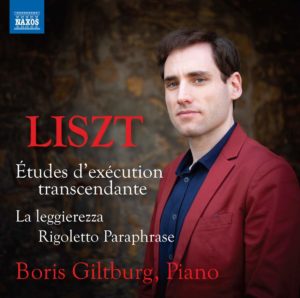Boris Giltburg’s Liszt Transcendental Études abound with fussy rhythmic adjustments and quirky voicings that usually stop the music in its tracks and prevent a sense of flow and momentum. You hear this right from the start in the opening étude’s accelerandos and ritards (Giltburg’s, not Liszt’s). No. 2’s petulantly picky accents serve no tangible musical purpose, although the pianist’s understated and lyrically oriented reading of Feux follets works on its own terms. His sectionalized approach to the swashbuckling virtuosic passages in Eroica and Wilde Jagd conjures up striking local details, but little of the heroic sweep of, say, Claudio Arrau’s interpretations. While Giltburg understandably downplays the Tenth étude’s surface flamboyance in pursuit of poetry, the music’s narrative trajectory and clear foreground/background textures lose focus in the process; Kirill Gerstein’s superficially similar yet more cohesive interpretation beats Giltburg at his own game.
Despite Giltburg’s beautiful sounds, the lyrical Paysage, Ricordanza, and Harmonies du soir meander, yet Mazeppa receives a vividly characterized and tonally varied rendition that never for a moment lapses into clattery bombast. There’s a high level of sophisticated pianistic grooming throughout Giltburg’s Rigoletto Paraphrase, but little indication of the music’s vocal orientation. La leggierezza also exemplifies Giltburg’s virtues and defects as a Lisztian. On one hand, he shapes phrases so that they glide over the barlines, while molding trills and florid passages with loving care and tonal beauty. On the other hand, Giltburg’s pulling back at climaxes and his vaguely proportioned rubatos draw further attention to his indifferent sense of form. In the five years that have transpired since Giltburg’s 2013 Queen Elisabeth Competition victory, I remain impressed with his pianism and frustrated by his artistry and musicianship.
































